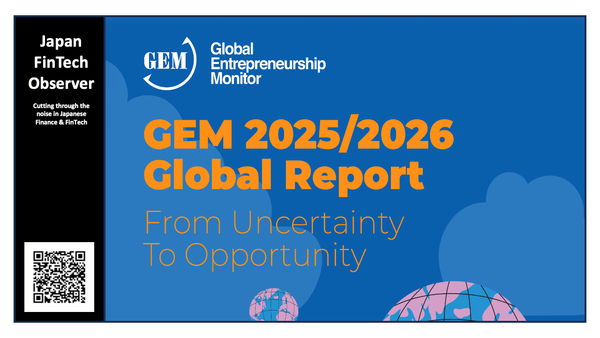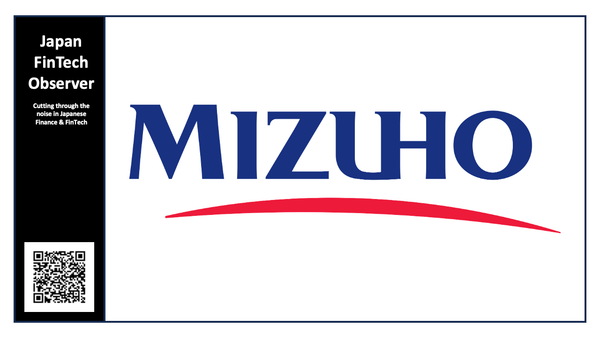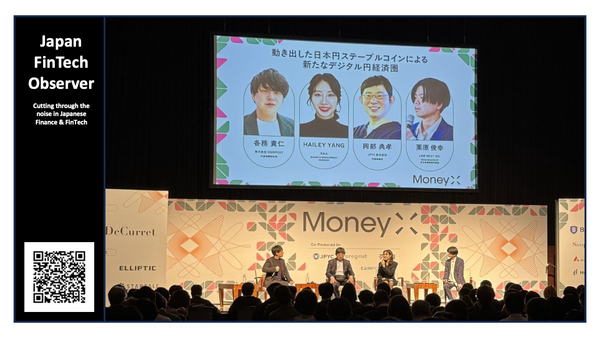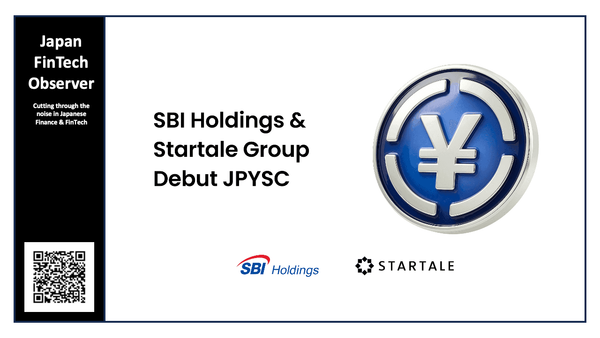Japan FinTech Observer #125

Welcome to the one hundred twenty-fifth edition of the Japan FinTech Observer.
Chaos, chaos, everywhere! The subway line to the Osaka Expo 2025 broke down, leaving thousands of people stranded late into the night. McDonald's offered a Pokemon promotion, leading to piles of "Happy Meals" discarded in their shops, stripped of the limited edition cards.
Thankfully, we operate in the orderly world of FinTech and crypto, where people actually know how to behave, the machine runs perfectly, and malfeasance is far from everybody's mind.
Hence we have announcements for the first "real" stablecoin in Japan (vis-a-vis tokenized deposits or tokenized trust certificates), a Japanese blockchain firm building a CBDC pilot in Pakistan, and a payments firm filing for what will most likely be the largest ever IPO for a Japanese firm in the US markets. Stay calm and FinTech on! (editor's note: that is NOT a verb)
Here is what we are going to cover this week:
- Venture Capital & Private Markets: SBI Investment participates in crypto payments network Mesh's funding round; Real Estate Tech "TRUSTART" raises JPY 1.3bn in Series C; the SMBC Asia Rising Fund has acquired a 4.99% stake in Shivalik Small Finance Bank; JIC decided to establish a JPY 800bn buyout fund; the draft report of the "Roundtable on the Supply of Growth Funds to Startup Companies" has been published
- Banking: banking stocks have filled the post-"Liberation Day" gap
- Payments: the Nikkei reported JPYC's plans of obtaining a money transfer license and launching a JPY-backed stablecoin as "breaking news"; the State Bank of Pakistan has chosen Japanese blockchain developer Soramitsu to design and implement a central bank digital currency; integrated payment solutions provider CITCON has joined forces with Japan-based firm GMO Payment Gateway to expand cross-border payment capabilities; PayPay Corporation has confidentially submitted a draft registration statement for a US IPO
- Digital Assets: Bitcoin Treasury company Metaplanet presented its earnings for the second quarter of Fiscal Year 2025; KAIO announced the expansion of its tokenized fund offerings on the Hedera network, including the Laser Digital Carry Fund (LCF); Toyota Ventures' portfolio company, Holyheld, has officially launched BRRR, a universal settlement layer designed to seamlessly connect blockchain networks with traditional payment systems; Rakuten Group has introduced "NFT tickets" for its professional sports teams
- The Last Word: Happy Meals
Venture Capital & Private Markets
- SBI Investment participates in crypto payments network Mesh's funding round: Mesh, the leading crypto payments network, announced additional investments from PayPal Ventures, Coinbase Ventures, Uphold, Mirana Ventures (venture partner for ByBit), SBI Investment, Overlook Ventures, Kingsway Capital, Moderne Ventures and CE-Ventures, bringing total capital funding to more than $130 million; this support positions the company to accelerate its impact on the global payments industry; Mesh's technology supported the launch of PayPal's "Pay with Crypto" service, which allows consumers to pay with a wide range of cryptocurrencies and eligible wallets; Mesh's technology enables consumers to seamlessly pay using 100+ wallets and cryptocurrencies through Mesh's SmartFunding orchestration engine; this allows PayPal merchants to tap into a rapidly growing $3 trillion market with over 650 million crypto users
- Real Estate Tech "TRUSTART" raises JPY 1.3bn in Series C: TRUSTART, which supports DX transformation of users' real estate-related operations through proprietary real estate big data collection, has raised 1 billion yen through third-party allotment to HIRAC FUND (MoneyForward Venture Partners), Daiwa Corporate Investment, Mitsubishi UFJ Capital, Japan Venture Capital, Asia Air Survey, Iwagin Future Investment, GMO VenturePartners, mint, SMBC Venture Capital, Sagin Capital & Consulting, and Terrasky Ventures; additionally, through 300 million yen in debt financing from Resona Bank and Sumitomo Mitsui Banking Corporation, the total funding raised amounts to 1.3 billion yen
- The SMBC Asia Rising Fund has acquired a 4.99% stake in Shivalik Small Finance Bank for $7 million, valuing the bank at ₹1,200 crore; this investment, along with additional funding from existing investors like Accel and Lightspeed, will fuel Shivalik's digital expansion and workforce growth, targeting MSME and retail customers
- Amid market pressure to enhance corporate value, domestic companies are increasingly finding it necessary to restructure their businesses, and the scale of such projects is expanding; however, the number of private funds that can support large-scale projects is limited; diversification of players is necessary to promote initiatives by companies; given this situation, ① JIC established an investment policy for large buyout funds, and ② JIC decided to establish JICC Fund No. 2 (total amount: 800 billion yen; scheduled for autumn 2025)
- Draft report of the "Roundtable on the Supply of Growth Funds to Startup Companies" published: the Japan Securities Dealers Association has been holding a "Roundtable Meeting on the Supply of Growth Funds to Startup Companies and Other Entities" to consider issues regarding the trading system for unlisted shares based on the needs of market participants, and the FSA has been participating in this meeting as a co-host and to advance the discussions; the Roundtable has published its draft report as of July 31, 2025, outlining a strategic vision and a detailed set of policy recommendations aimed at revitalizing Japan's startup ecosystem by enhancing the mechanisms for capital supply to unlisted companies; it directly addresses the goals set forth in the Japanese government's "Five-Year Plan for Startup Development" (November 2022) and the "Regulatory Reform Implementation Plan" (June 2024), which call for the vitalization of both the primary (issuance) and secondary (trading) markets for unlisted stocks
FSA Meetings with Industry Associations during June 2025
The Financial Services Agency (FSA) held a series of meetings with Japan's financial industry associations, outlining its key priorities and concerns. The discussions reveal a strong focus on enhancing governance, strengthening cybersecurity, and ensuring customer-centric operations across the entire financial system.
Several key themes were consistently raised by the FSA in meetings with nearly all associations, indicating agency-wide priorities:
Strengthening Cybersecurity
- Countermeasures for Unauthorized Access: A universal demand to urgently enhance security against phishing, malware, and other forms of unauthorized access to customer accounts, with a strong push for mandatory multi-factor authentication (MFA).
- Transition to Post-Quantum Cryptography (PQC): The FSA stressed the need for all financial institutions to begin immediate preparations for the transition to PQC to protect against future threats from quantum computers. Institutions were told not to delay and to start creating roadmaps with their IT vendors.
- Abolishing Password-Protected ZIP Files: The FSA explicitly called for an end to the "undesirable" and insecure practice of sending password-protected files via email, citing risks of malware infection and urging the use of secure alternatives like encrypted communication channels or secure online storage.
Anti-Money Laundering (AML) / Countering the Financing of Terrorism (CFT)
- All institutions are required to conduct an "effectiveness verification" of their AML/CFT measures and be able to explain the results rationally and objectively, particularly in anticipation of the 5th FATF Mutual Evaluation.
- The FSA urged institutions to review and update their practices based on the revised "Reference Cases of Suspicious Transactions" to better detect and report illicit activities.
Enhancing Internal Audits
The FSA highlighted its "Discussion Group on Enhancing Internal Audits" and announced an upcoming report in June 2025. All associations were instructed to use this report as a guide to significantly improve the level and effectiveness of their internal audit functions.
International Financial Topics (G7 Meeting)
The key outcomes of the May 2025 G7 Finance Ministers' and Central Bank Governors' Meeting were shared, covering topics such as financial stability, risks from non-bank financial intermediaries (NBFI), the benefits and risks of AI, and strengthening responses to cyber risks and financial crime.
Banking

Japanese banking stocks have been on a tear, filling the gap created by the "Liberation Day Shock", and with the expectations for a Bank of Japan policy rate raise at about 70% for this calendar year (50% probability for the October Monetary Policy Meeting), the trade on improving net interest margins has resumed.

J.P. Morgan, which had been overweight Japanese banks vs global banks since April 2023, continues to stay with this weighting.
- ANZ has appointed Ender Tanar as country head for ANZ Japan; Tanar is currently country head for Germany, a role he has occupied for seven years; before this, he held senior positions at Lloyds Bank, Mizuho, KPMG, and JPMorganChase
Payments

- Dr Sangmin Seo, Chairman of the Kaia DLT Foundation, has been examining South Korea’s tightly controlled CBDC approach versus Japan’s open stablecoin framework
- The Nikkei has served a bit of a nothing-burger as "breaking news": it reported that "The Financial Services Agency will approve the issuance of yen-denominated stablecoins, whose value is pegged to fiat currency, for the first time in Japan as early as this fall; Fintech company JPYC will register as a money transfer business within the month;" This is exactly what JPYC described they would do when they had to stop the issuance of "JPYC Prepaid" as of June 1, 2025; read up on the approach that JPYC laid out
- The State Bank of Pakistan (SBP) has chosen Japanese blockchain developer Soramitsu to design and implement a central bank digital currency (CBDC), following last month’s federal approval of the Virtual Assets Act 2025; Soramitsu will work with the SBP on a pilot programme to introduce the CBDC, part of a broader strategy to regulate and integrate digital assets into Pakistan’s financial system; the legislation, approved on July 9, establishes the Pakistan Virtual Asset Regulatory Authority (PVARA), an independent federal body tasked with licensing and overseeing entities dealing in virtual assets
- Integrated payment solutions provider CITCON has joined forces with Japan-based firm GMO Payment Gateway to expand cross-border payment capabilities; the alliance is an extension of GMO-PG's previous investment in Citcon and aims to enhance the payment offerings available to merchants across several key markets; it will enable Citcon to incorporate GMO-PG's Japanese payment methods into its existing platform, which include credit cards, digital wallets, and convenience store payments; consequently, merchants operating in the US, Canada, the UK, and China will be able to accept payments commonly used by Japanese consumers
- PayPay Corporation has confidentially submitted a draft registration statement on Form F-1 to the U.S. Securities and Exchange Commission relating to the proposed public listing of American depositary shares representing its common shares on a U.S. stock exchange; the exact schedule, size and price for the public listing have not yet been determined; the feasibility of proceeding with the public listing is subject to market and other conditions and is contingent upon the completion of the SEC’s review process; just as we wrote in "PayPay Powers LY Corp's First Quarter as it Prepares for IPO" only a few days prior
Digital Assets
- Metaplanet presented its earnings for the second quarter of Fiscal Year 2025
- Komainu, the digital asset custodian jointly owned by Nomura, CoinShares, and Ledger, provides a true institutional-grade off-exchange trading infrastructure, combining regulated custody with seamless access to execution; through a tri-party framework involving Komainu, OKX, and Atitlan Asset Management, Atitlan are able to deploy capital across their BTC quant strategies without ever relinquishing custody to exchanges; this solution decreases exchange risk and materially reduces operational and counterparty exposure, aligning perfectly with the expectations of BTC-native allocators and institutional LPs
- KAIO announced the expansion of its tokenized fund offerings on the Hedera network, including the Laser Digital Carry Fund (LCF); Laser Digital is a digital asset business redefining the frontier of digital finance; backed by Nomura, Laser Digital delivers scalable, robust opportunities across trading, solutions, asset management and ventures; by combining KAIO’s institutional-grade infrastructure with the Hedera network’s high-performance, sustainable public DLT, the integration enables secure, compliant, and composable access to alternative investment products directly on-chain; Laser Digital’s Laser Carry Fund (LCF) has been successfully tokenized and distributed via KAIO on the Hedera network; the fund aims to generate returns by capturing funding rate inefficiencies and staking yield opportunities in the digital asset space while maintaining market neutrality
- Toyota Ventures' portfolio company, Holyheld, has officially launched BRRR, a universal settlement layer designed to seamlessly connect blockchain networks with traditional payment systems; BRRR empowers any financial institution or service provider to orchestrate programmable, onchain transactions at a global scale through a single API call; the platform provides a compliant, developer-friendly experience with out-of-the-box support for any network, token, or smart contract logic; the platform has already achieved significant traction: connected with 20 networks, integrated with over 150 protocols, powered the largest card in Web3, and processed more than $200M in real-world payments
- Rakuten Group has introduced "NFT tickets" to the official ticket resale of the professional baseball team Tohoku Rakuten Golden Eagles and the J1 soccer team Vissel Kobe on its NFT marketplace, Rakuten NFT; NFT tickets are digital tickets that use blockchain technology to record transaction history and owner information in an unalterable form; this not only offers technological benefits such as preventing counterfeiting and double transactions, but also ensures transparency in transactions, making purchases and resales safer than ever before; while traditional resales have fixed listing prices, sellers of NFT tickets can set their own prices
The Last Word: Happy Meals

Fast-food chain McDonald’s Japan has canceled a Happy Meal campaign that came with coveted Pokemon cards, apologizing after resellers rushed to buy the meals and then discarded the food, leaving trash outside stores.
The meals, called Happy Sets in Japan, were meant for children. They came with a toy, such as a tiny plastic Pikachu, and a Pokemon card. They sold out in a day, according to Japanese media reports.
Mounds of wasted food were found near the stores.
Please follow us to read more about Finance & FinTech in Japan, like hundreds of readers do every day. Our short weekly digest, the “Japan FinTech Observer”, is published on LinkedIn, on Medium & Substack, or here on our own FinTech Observer website. Only the latter provides you with the option to subscribe to individual news stories as they are published.
Should you wish to further discuss the Japanese (or Asian) FinTech ecosystem, you may book a consultation via Intro - all proceeds flow towards covering the operating cost of the Tokyo FinTech Association, and research for the Japan FinTech Observer.




